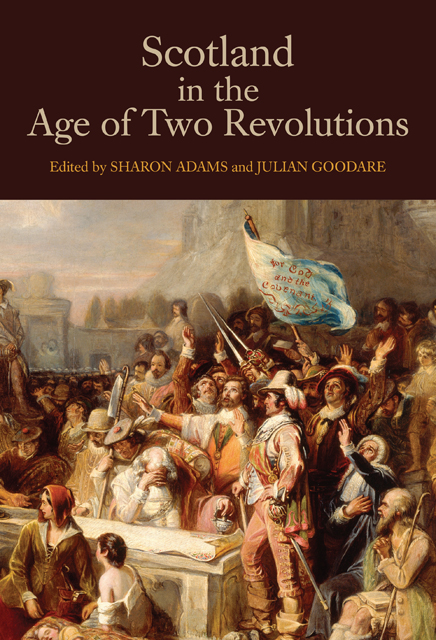Book contents
- Frontmatter
- Dedication
- Contents
- Figures and Tables
- List of Contributors
- Preface
- List of Abbreviations
- 1 Scotland and its Seventeenth-Century Revolutions
- 2 The Middle Shires Divided: Tensions at the Heart of Anglo-Scottish Union
- 3 The Western Highlands and Isles and Central Government, 1616–1645
- 4 The Scottish Bishops in Government, 1625–1638
- 5 The Scottish Revolution
- 6 In Search of the Scottish Republic
- 7 Highland Lawlessness and the Cromwellian Regime
- 8 The Worcester Veterans and the Restoration Regime in Scotland
- 9 The Political Thought of the Restoration Covenanters
- 10 Scottish State Oaths and the Revolution of 1688–1690
- 11 The Tribulations of Everyday Government in Williamite Scotland
- 12 The Company of Scotland and Scottish Politics, 1696–1701
- Chronology of Seventeenth-Century Scotland
- Further Reading
- Index
- Studies in Early Modern Cultural, Political and Social History
12 - The Company of Scotland and Scottish Politics, 1696–1701
Published online by Cambridge University Press: 28 February 2023
- Frontmatter
- Dedication
- Contents
- Figures and Tables
- List of Contributors
- Preface
- List of Abbreviations
- 1 Scotland and its Seventeenth-Century Revolutions
- 2 The Middle Shires Divided: Tensions at the Heart of Anglo-Scottish Union
- 3 The Western Highlands and Isles and Central Government, 1616–1645
- 4 The Scottish Bishops in Government, 1625–1638
- 5 The Scottish Revolution
- 6 In Search of the Scottish Republic
- 7 Highland Lawlessness and the Cromwellian Regime
- 8 The Worcester Veterans and the Restoration Regime in Scotland
- 9 The Political Thought of the Restoration Covenanters
- 10 Scottish State Oaths and the Revolution of 1688–1690
- 11 The Tribulations of Everyday Government in Williamite Scotland
- 12 The Company of Scotland and Scottish Politics, 1696–1701
- Chronology of Seventeenth-Century Scotland
- Further Reading
- Index
- Studies in Early Modern Cultural, Political and Social History
Summary
The Company of Scotland Trading to Africa and the Indies was established by act of parliament in 1695, and between 1698 and 1700 attempted to establish a colony at Darien on the isthmus of Central America. The historiography of this well-known episode has focused on the company as an instrument of colonialism. However, the abandonment of the Darien settlement was also central to the political crisis that developed over the period 1698–1701. There was vociferous opposition in parliament, and extra-parliamentary activity including two national addresses, a propaganda battle and popular protest on the streets. One commentator in June 1700 feared a repeat of the covenanting radicalism of the 1640s: ‘the ferment still continues, and new addresses are daily coming in from all parts of the country … God help us, we are ripening for destruction. It looks very like Forty-one.’
An important feature of the politics of the period was the rise of an opposition grouping. This took shape over several years, and from the parliament of 1698 was known as the country party. The relationship between the Company of Scotland and the country party was briefly commented on by Patrick Riley in his detailed study of Scottish politics: ‘from almost the beginning, the organisation of the African Company had looked remarkably like the opposition going into business’. But he did not explore the subject further. This chapter will seek to determine whether his assertion is correct by examining the relationship between the company and party politics. The political allegiance of the managers of the company, the court of directors, has received little attention from historians. The relationship between directors and country party should provide a fresh perspective on the politics of Williamite Scotland.
I
The 1690s was a decade of significant development in financial capitalism, witnessing the spectacular growth of capital markets in London, a liquid government debt market and a stock market. Historians have applied the term ‘financial revolution’ to these developments. Scotland experienced its own financial revolution, with forty-seven joint stock companies established in the boom period from 1690 to 1695, including the Company of Scotland itself and the Bank of Scotland. These indicate the presence of a pool of capital and investors.
- Type
- Chapter
- Information
- Scotland in the Age of Two Revolutions , pp. 211 - 230Publisher: Boydell & BrewerPrint publication year: 2014
- 1
- Cited by

